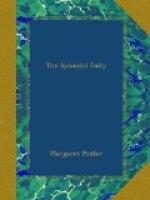With Errington at the piano the music took on a different aspect. He was an incomparable accompanist, and Diana, feeling herself supported, and upborne, sang with a beauty of interpretation, an intensity of feeling, that had been impossible before. And through it all she was acutely conscious of Max Errington’s proximity—knew instinctively that the passion of the song was shaking him equally with herself. It was as though some intangible live wire were stretched between them so that each could sense the emotion of the other—as though the garment with which we so persistently conceal our souls from one another’s eyes were suddenly stripped away.
There was a tense look in Max’s face as the last note trembled into silence, and Diana, meeting his glance, flushed rosily.
“I can’t sing any more,” she said, her voice uneven.
“No.”
He added nothing to the laconic negative, but his eyes held hers remorselessly.
Then Pobs’ cheerful tones fell on their ears and the taut moment passed.
“Di, you amazing child!” he exclaimed delightfully. “Where did you find a voice like that? I realise now that we’ve been entertaining genius unawares all this time. Joan, my dear, henceforth two commonplace bodies like you and me must resign ourselves to taking a back seat.”
“I don’t mind,” returned Joan philosophically. “I think I was born with a humdrum nature; a quiet life was always my idea of bliss.”
“Sing something else, Di,” begged Stair. But Diana shook her head.
“I’m too tired, Pobs,” she said quietly. Turning abruptly to Errington she continued: “Will you play instead?”
Max hesitated a moment, then resumed his place at the piano, and, after a pause, the three grave notes with which Rachmaninoff’s wonderful “Prelude” opens, broke the silence.
It was speedily evident that Errington was a musician of no mean order; indeed, many a professional reputation has been based on a less solid foundation. The Rachmaninoff was followed by Chopin, Tchaikowsky, Debussy, and others of the modern school, and when finally he dropped his hands from the piano, laughingly declaring that he must be thinking of taking his departure before he played them all to sleep, Joan burst out bluntly:—
“We understood you were a dramatist, Mr. Errington. It seems to me you have missed your vocation.”
Every one laughed.
“Rather a two-edged compliment, I’m afraid, Joan,” chuckled Stair delightfully.
Joan blushed, overcome with confusion, and remained depressed until Errington, on the point of leaving, reassured her good-humouredly.
“Don’t brood over your father’s unkind references to two-edged compliments, Miss Stair. I entirely decline to see any but one meaning to your speech—and that a very pleasant one.”
He shook hands with the Rector and Diana, holding the latter’s hand an instant longer than was absolutely necessary, to ask, rather low:—




